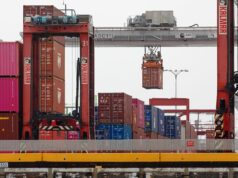Moody’s says fresh rate hike should help temper ‘imported’ inflation
By Melissa Luz T. Lopez
Senior Reporter
ADDITIONAL rate hikes from the central bank will temper exchange rate movements and outbound capital flows, Moody’s Investors Service said, against a backdrop of a resilient and fast-growing economy.
In its annual credit update, the debt watcher said the Philippines shows “high” economic strength and is expected to weather the “temporary” episode of faster inflation.
“Bangko Sentral ng Pilipinas (BSP) the Philippines’ central bank, has already hiked policy rates twice to anchor inflation expectations. Tighter monetary policy will also serve to temper capital outflows, peso depreciation and, hence, imported inflation,” Moody’s said in the report sent to reporters yesterday.
The peso has been trading weaker than P53 per dollar since mid-June, but has been gaining strength in the past few days amid bets that the BSP will raise benchmark interest rates for the third time this year in next week’s policy review.
At the same time, the debt watcher said that it “expects the rise in prices since the beginning of 2018 to be temporary and not as a result of excessive overheating risks.”
Moody’s made these remarks after it affirmed the Philippines’ credit rating at “Baa2” with a “stable” outlook last month, keeping the country one notch above minimum investment grade. It took stock of the fast-growing economy and improving revenue base, but flagged rising prices and “domestic political developments” — particularly the planned shift to a federal government system — as key risks.
Credit analysts also noted that recent trends in commodity prices present a major challenge for policy makers in terms of managing inflation pressures, but pointed out that these remain “transitory.”
“We also do not expect the acceleration in the pace of growth in oil prices earlier this year to be sustained,” Moody’s said, noting that it expects inflation to return to the 2-4% target range by next year.
Inflation has shot beyond target to average 4.3% last semester, hitting a nine-year high of 5.2% in June.
For July, the central bank said prices may have picked up even faster by 5.1-5.8% year-on-year, which if realized will mark a fresh multi-year peak.
Simon Chen, senior analyst at Moody’s, earlier said that future rate increases from the central bank are likely to be “gradual” and “modest,” which will be manageable for both banks and borrowers as far as loan pricing is concerned.
NOMURA SEES 50 BP HIKE
In a separate market report, Nomura economists said they expect the Monetary Board to raise key interest rates by 50 basis points (bp) next week, taking cue from BSP Governor Nestor A. Espenilla, Jr.’s signal of a “strong follow-through” in monetary policy action next week.
“We read this as a step up from a ‘measured’ response, which was the language BSP officials used ahead of previous 25bp rate hikes,” the bank analysts said yesterday ahead of the Aug. 9 policy review.
“We put a lot of weight in Governor Espenilla’s comments because he tends to be deliberate in his signals, and — as decisions at the last two meetings demonstrate — there is ultimately follow-through action even though decisions are collective on the part of the Monetary Board.”
Meanwhile, Moody’s gave the Philippines a better score in terms of managing the economy.
“We set the Philippines’ institutional strength score at ‘Moderate (+),’ one notch above the indicative score of ‘Moderate,’ to reflect its track record of fiscal and monetary policy effectiveness,” the debt watcher said.
“The government’s demonstrated ability to pursue its economic and fiscal reform agenda in the face of heightened political noise informs our assessment, despite a deterioration in the Worldwide Governance Indicators.”
It noted that the Duterte administration was able to deploy “considerable” political capital to push key reforms, resulting in enactment of the first of up to five planned tax reform packages and the Ease of Doing Business law, as well as increased infrastructure spending and expanded social protection programs.
“Fiscal authorities have continued to focus on revenue reform, budgetary control, and proactive debt management, which have combined to result in lower debt and debt servicing costs over the past decade,” Moody’s noted.
“Political noise has not resulted in a significant reduction in the President’s approval ratings, negative spillovers to business and consumer sentiment, or a decrease in the government’s ability to advance its socioeconomic reform agenda.”
The credit rater gave the Philippines a “high” score for economic strength in the face of rising prices, a volatile external financial market and local political noise. Moody’s expects the Philippines to remain a growth leader in Asia, attracting even more foreign investments that, in turn, will support further expansion.
Moody’s expects the economy to expand by 6.8% in 2018, which would be faster than last year’s 6.7% but will fall short of the state’s 7-8% goal.



